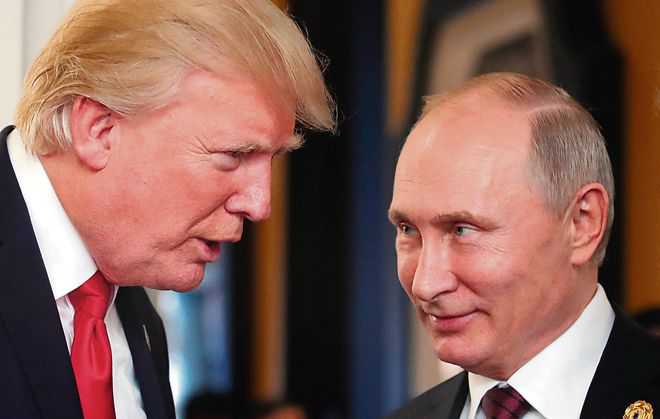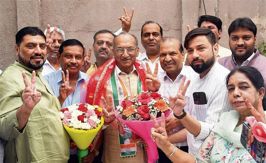
Runs deep: Russia and the US, for years, have been attempting to manipulate each other’s elections to support their favoured candidates.
Krishnan Srinivasan
Former foreign secretary
Foreign interference, networking, meddling and intervention have entered the geopolitical diplomatic vocabulary as unwelcome aspects of the electoral process in numerous countries. With less than a year before the next US presidential polls, there will be heightened attention to allegations of foreign interference, especially by Russia due to the prevalent Russophobia in US political and media circles, and also from a potentially long list of other adversaries. The mainstream and social media managers will be on guard against attempts to sway public opinion and to maintain the appearance of impartiality. Should President Trump be re-elected, impeachment and accusations of colluding with foreigners to influence the elections in his favour will be high on the Democratic Party’s agenda for the remainder of his term in office.
In practice, and according to accounts available in the public domain, both Russia and the US have been involved in attempting the manipulation of each other’s elections to support their favoured candidates. From interviews, memoirs and declassified intelligence reports, US efforts to influence elections in Iran, Guatemala, Italy, Chile, Nicaragua, Serbia, Iraq and Afghanistan are well documented. US intelligence operatives and academics specialising in covert activity assert that the objectives are the same, though the technology changes.
In the case of the two global adversaries, the trend is of long standing, dating back to the Russian Revolution. In 1918, several thousands of US troops were sent to Siberia to fight the ‘Reds’ in the Russian Civil War, and Moscow formed the Communist International in 1919 to stimulate revolutionary change abroad by disseminating disinformation and propaganda.
During the Cold War from 1948 to 1988, the interference was institutionalised. The US Communist Party, largely under the control of Moscow and supplied with printed propaganda, was active in US politics until the McCarthy anti-Communist crackdown. US meddling in Soviet internal affairs in its most overt manifestation took the form of short-wave radio broadcasts, with Radio Free Europe the most prominent exponent.
In the post-Soviet period since 1992, until the allegations against Russia began in 2016 with the elections that brought Trump to power, almost all interference was committed by the US, with Washington openly supporting through political and financial means pro-US factions and NGOs in Russian politics. US media and the Clinton administration lent their support to Russian President Boris Yeltsin’s successful campaign for re-election in 1996. This was supported, in turn, by a pro-Yeltsin lobby, mainly made up of US citizens, in Washington. Until harsher Russian laws were introduced, US support to Russian media and NGOs under the banner of democracy promotion continued after 2000 as well.
With the rise of social media in its myriad forms and greater scope for deniability, Russian activity during the US 2016 election, both its perceived threat and the strong reaction it provoked from US political and media circles, came vividly to the forefront, although it has to be said that there was hardly any evidence of any discernible impact on the outcome of the election. A Russian woman, Maria Butina, was imprisoned in the US for 15 months for networking without being registered as a foreign agent on behalf of Russia, and hundreds of Americans have networked similarly in Russia. Foreign news agencies and channels enjoy far greater freedoms in Russia than Russia Today (RT) does in the US or the EU. However, the previously nonchalant attitude on the part of Russia may be changing, and payments made for democracy promotion by the American National Endowment for Democracy, the National Democratic Institute and the International Republican Institute are now far more closely scrutinised.
Americans hold that their efforts are benign and charitable and reject any accusations of comparability to what the Russian government is alleged to be doing in Western elections. In their view, there is no moral equivalence; US interventions are to help non-authoritarian candidates and promote democracy, and the boldly expressed hope is that these efforts will continue.
Added to the many controversies relating to the forthcoming British general election is an intelligence report compiled by British authorities on Russian interference in the 2016 Brexit referendum and the 2017 national elections, which has been suppressed by the Boris Johnson government until after the elections are over. Recently, the Labour Party’s website was hacked by unknown political antagonists.
Apart from Russia, other shadowy agencies are suspected to have influenced the British referendum leading to Brexit, including the Cambridge Analytica, a ‘data harvesting’ company which was also implicated in the 2014 Indian elections which brought the BJP to power, and the 2016 US presidential election on behalf of Trump.
The additional new ingredient is that modern technology has given rise to many other entrants in this field of interference, and information technology-capable countries have joined the battle on the open digital platforms for hearts and minds. This includes India, which, in the words of a distinguished former Indian ambassador, is ‘jostling for influence, pulling strings, shadow-boxing, dissimulating and keenly orchestrating a predictable outcome’. India’s neighbours in South Asia have complained in the past of such interference. No one, serving or retired, in the New Delhi establishment, has drawn back the veil on such Indian enterprises, but it will come as no great surprise when it happens.



























